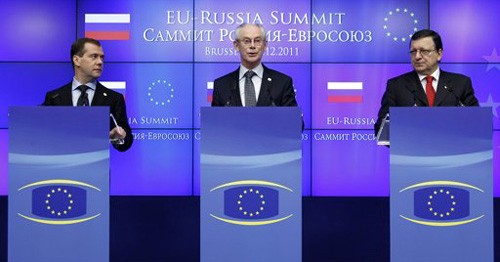The 28th Russia-EU summit has kindled a ray of hope, as both sides reconfirmed their strategic partnership, reached agreements on mutual visa-free travel and Russia’s membership in the World Trade Organization. Our editor now comments of the outcome of the 2 day meeting, which concluded in Brussels on Thursday.
 |
| Russian President Medvedev (left) at a press conference with Preident of the European Commission Jose Manuel Barroso and President of the European Council Herman Rompuy (Photo: Reuters) |
The summit’s top 3 agenda items were the global financial crisis, EU-Russia coordination within G8 and G20, and the signing of an agreement on Russia’s admission to the WTO. Other topics were the fight against climate change, the situation in the Middle East, North Africa and Kosovo and energy cooperation.
Prior to the summit, there was considerable doubts about its success. The EU has been divided over the best ways to tackle the current public debt crisis, and its relations with Russia have been deteriorating. The deployment of the US National Missile Defence shield (NMD) in Poland and the Czech Republic is provocative to Moscow, who views the plan as a threat to strategic balance. Nikolai Makarov, Chief of the General Staff of the Russian
Armed Forces said recently that NMD is the thorniest problem in Russia-EU relations. However, the just-concluded summit brought positive results as both sides set aside their differences to focus on common goals. Herman Van Rompuy, President of the European Council, said the approval of an agreement on visa exemption marked a step toward free travel that will boost people’s exchanges and in particular will boost tourism between Russia and nations bordering the Mediterranean sea.
Observers say the summit’s outcomes signal greater mutual trust. Moscow announced its willingness to provide financial assistance through the International Monetary Fund to help the EU to deal with its debt crisis. With Russian President Dmitry Medvedev saying that only Europe can help Europe, Moscow is considering necessary investment measures to help restore the economies in the Eurozone. Though Medvedev did not reveal the size of the bailout package, it is rumored to be about 20 billion USD, half of which will be disbursed in a few weeks. Both sides shared common viewpoint on recent UN Security Council action and the Arab League’s plan over Syria and seeking a diplomatic solution to the Iranian nuclear issues.
The EU is now Russia’s biggest trading partner and a major investor, while Russia is one of the 3 largest trading partners of the EU and a main energy supplier to Europe.
Anh Huyen